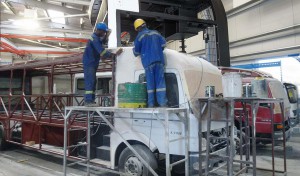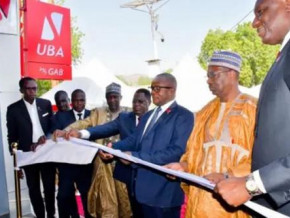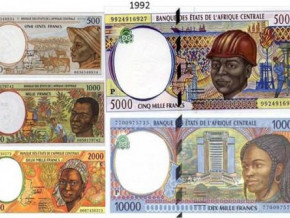
Chinese CHEC will deliver Kribi-Lolable motorway, under construction in Southern Cameroon, in 2018
In addition to the ordinary 32-km long road which is currently servicing the deep-water port of Kribi, the largest port structure in Cameroon will be served by a motorway from 2018. The completion rate of this 38.5-km long motorway built by the Chinese company CHEC is over 66%, indicate the management of the operational unit in the project for the construction of the industrial and port complex of Kribi.
With the delays currently observed in the construction works for the Yaoundé-Douala (first stretch of 80 km) and Yaoundé-Nsimalen (20 km to service the capital’s airport) motorways, the Kribi-Lolablé highway could, from 2018, become the first structure of this type in Cameroon.
As a reminder, the global cost of this highway project is officially estimated at FCfa 250 billion, with 86% of the funding provided by Exim Bank of China, and 15% from the State of Cameroon. Based on projections made by the government, the Kribi-Lolablé motorway will later join the Edéa-Kribi motorway, thus enabling vehicles to easily reach the deep-water port of Kribi from Douala, the economic capital of the country.
BRM
After evicting Necotrans, and despite Bolloré’s interests, ICTSI and Olam have views on the multipurpose terminal at the port of Kribi
On 25 and 28 July 2017, the Singaporean group Olam and Philippine ICTSI respectively contacted the Cameroonian government, to express their interest in taking over from French Necotrans in the consortium declared winner (in 2015) of the contract for the concession of the multipurpose terminal at the deep water port of Kribi, awaiting commissioning in the Southern region of Cameroon.
This information was revealed by the newspaper Integration, at the time when the newspaper Les Echos was rather announcing a consortium led by the Bolloré group taking over the assets of Necotrans at the port of Kribi, following the legal liquidation of the assets of the group Necotrans as per a ruling in France.
For the moment, sources within the Cameroonian subsidiary of Bolloré Transport Logistics are denying this information on the takeover of the assets of Necotrans at the multipurpose terminal in the deep water port of Kribi.
But, if it was confirmed, this positioning by French logistics company Bolloré on the multipurpose terminal in the largest port in Cameroon, after winning the contract for the container terminal in association with CHEC and CMA CGM, could lead to legal issues, according to experts.
Experts invoke the fact that, prior to its eviction from the consortium formed with KPMO to operate the multipurpose terminal of Kribi, Necotrans has not yet signed a formal concession contract with the Cameroonian authorities. Consequently, this operator may not claim any right on this terminal where he was not able to fulfil its first commitments, due to insolvency.
Brice R. Mbodiam
Cameroon: Company SICC announces delivery of a market/shopping mall with nearly 1400 shops in 2018, in the city of Douala
Initially planned for September 2016, delivery of a construction project of close to 1400 shops on the former site of Congo market in Douala, the Cameroonian economic capital, will finally take place in 2018, about 2 years behind schedule.
At least this is the new timeline provided by the company SICC (SouthWest International Construction Corporation), the product of a joint venture between American partners and Cameroonian economic operators. "We have had delays, admittedly, but the obstacles have been overcome. Today, calm has been restored", explained Brigitte Soppo Ngallé, director of SICC, after the agreement signature with the American partners.
The cost of this project designed under the model of a public-private partnership, with the Urban Community of Douala, the municipal Town hall of the economic capital, is estimated at around FCfa 7 billion. The materials used are prefabricated, thanks to technology provided by the American partners.
BRM
Italian Bombelli wants to set up shoe-making factory in Cameroonian town of Bafoussam
In partnership with the Competitiveness Committee of Cameroon, the Italian company Bombelli, one of the world leaders in equipment and machinery for the shoe industry, is planning to create a manufacturing plant in the town of Bafoussam, in the Western Cameroon region.
The information was revealed by Adamou Siddiki, a manager in the leather workers’ professional association. This was during a meeting between Cameroonian economic operators and Samuela Isopi, Italian Ambassador nearing the end of her stay in Cameroon, who thus wished to review the state of progress in certain business contacts established between Italian and Cameroonian investors.
On this subject, we learned from the same source, the Nouvelles Tanneries du Cameroun (Notacam) will soon benefit from the expertise of the Italian company Copar Srl, as part of a technical assistance scheme.
BRM
British investment fund Actis wants to build FCfa 80 billion tourist centre in Cameroon
The British investment fund Actis announces the launch, from November 2016, of construction works for a tourist centre in the city of Douala, the Cameroonian economic capital. This project, which includes a five-star hotel, a cinema and a shopping mall, will cost FCfa 80 billion.
This information was revealed during the signature of an agreement between the local representatives of this investment fund and he management of the Investment Promotion Agency (API) of Cameroon, a State organisation providing tax and customs preferential terms in the implementation of this project.
With this new investment, Actis is thus diversifying its activities in Cameroon, after buying, a few years ago, the assets of American AES in the capital of Eneo, the company holding the concession for the public electricity service in the country.
BRM
Lire aussi:
15-07-2016 - Une bataille franco-britannique s’annonce sur le marché camerounais de l’électricité
With China Ghezouba hesitating, Cameroon and Sundance are looking for alternative investors for Mbalam iron
With a signature announced for December 2015, then postponed to a later date, the partnership agreement with the company China Ghezouba, to carry out the works for the construction of infrastructure (500 km long railway and ore terminal at the deep water of Kribi) linked to the project to operate on the Mbalam iron deposit, straddling Cameroon and Congo, is still awaited over a year and a half later.
The hope of seeing this agreement signed seem to have even disappeared. This is at least what suggests the activity report as at end June 2017 of the junior Australian mining company Sundance Resources, promoter of this project meant to exploit to iron deposit with a potential officially estimated at 40 million tons.
Indeed, with the reluctance of China Ghezouba who, after a pre-agreement with the Cameroonian State, is now citing the weak economic situation for the international iron ore prices to avoid committing to this project, Sundance Resources reveals in the above-mentioned report, that it is now working with the government in the search for alternative investors, including Chinese companies. And that discussions with these potential new partners have been ongoing since the start of the 3rd quarter of 2017.
The approach used by the junior Australian mining company can be explained by the pressure applied on this mining group (who has the responsibility of securing funding for the construction of the mine) from the Cameroonian government.
Indeed, the management of Sundance confessed in the activity report for the first semester of 2017, even though the agreement for the Australian mining group on the Mbalam project has been extended to 26 January 2018, the Cameroonian government has added as condition to an ultimate extension for a period of six months (thus June 2018), that “Sundance must be able to prove that important progress has been made with regards to the financing of the Mbalam iron ore project, either with their owns funds, or with a credible partner”.
In other words, after several years of development on this ore project, which so far has not attracted many investors, the State of Cameroon (who itself has difficulties finding investors for the construction of the infrastructure linked to the project) has given until June 2018 to Sundance Resources to fund the required partners to build the mine, or withdraw from the project otherwise. A situation which would certainly please China Ghezouba, who according to sources close to the project, has discreetly hinted to the Cameroonian authorities its desire to be the sole investor on this mining project (eventually with other Chinese partners), but not with the initial sponsor which is the Australian mining group. As a reminder, with the inability of Sundance Resources to raise all the funds necessary for the launch of the operations on the Mbalam iron deposit, the Cameroonian government took the commitment, from June 2015, to find on its own the funding for the construction of the Mbalam-Kirin railroad (between FCfa 1,000 and 1,500 billion) on the one hand, and on the other hand, the ore terminal at the deep water port of Kribi (approximately FCfa 450 billion), which would help to export the iron from the Mbalam deposit. Only funding for the construction of the mine remain in the bill of specifications given to Sundance.
Brice R. Mbodiam
Lire aussi:
Cameroon: British Aggreko completed the installation of 10 MW thermal plant in Maroua
On Sunday 20 August 2017, technicians from Eneo, a company owned by the British investment fund Actis, moreover holder of the concession for the public electricity service in Cameroon, started the work to connect the Maroua thermal plant to the North interconnected grid (RIN - réseau interconnecté Nord), thereby signalling the completion of the installation of the plant, which had taken place since the end of July, according to a manager at Eneo.
This energy structure, constructed by the British company Aggreko, has a production capacity of 10 MW, and will enable to supplement the production unit of the Lagdo dam (72 MW) in periods of sharp increase in the electricity demand in the three northern regions of Cameroon.
“Before the works to connect to the power grid take place, the technicians will carry out tests throughout the week, to ensure that everything is in proper order of operation, and that households can indeed be supplied. It is after these verifications that the plant will effectively be commissioned”, explains a source within Eneo.
Once it is commissioned, the Maroua thermal plant will help to reduce the important production deficit registered on the Lagdo dam, sole energy infrastructure supplying the northern half of Cameroon to date. Indeed, for years now, due to silting in the reservoir, the Lagdo production unit often sees its capacities reduced by over 50% during periods of lower rainfall.
Coupled with the growing increase in the electricity demand from households and companies in the North, this situation generally leads to frequent power cuts. This was particularly the case between April and May 2017, period during which almost all the towns in the North were deprived of electricity two to three times per week, between 6 am and 10 pm.
Brice R. Mbodiam
Cameroon: new well drilled by British VOG in Logbaba gas field will enter into production in September 2017
Gaz du Cameroun (GDC), local subsidiary of British oil and gas producer Victoria Oil and Gas (VOG) responsible for production and distribution of gas to companies in the economic capital of Cameroon, will bring into service, from the month of September 2017, one of the two wells whose drilling activities had started in November 2016, we learned officially.
The supply of new gas should be available during the third quarter, which should allow us to finalise contracts with high usage customers, with whom we have been in discussion over these past months", confided Ahmet Dik, CEO of VOG.
Thanks to overall investments estimated at about FCfa 115 billion to date, the Logbaba gas project already allows the supply of natural gas to about 30 companies based in the city of Douala, the economic capital of Cameroon. The project has recently seen the arrival in its capital round of the national oil company Société Nationale des Hydrocarbures (SNH), the secular arm of the Cameroonian state in oil and gas operations, which has taken a 5% share.
BRM
Cameroonian Sotrabus becomes first vehicle assembly unit in Central Africa
Since 2015, Cameroon in particular, and Central Africa in general, has its very first car assembly unit. This is the Société de transformation de bus (Sotrabus – Bus Transformation Company), specialised in the assembly of the transport bus with 45, 50 and 70 seats.
Located in the port area in Douala, the Cameroonian economic capital, this company has 150 employees , who work at putting together two buses per month. According to Albert Mbafe Konkou, Cameroonian polytechnic engineer who owns Sotrabus, the buses produced in the port area of Douala are tropicalised, as they are adapted to African roads; a continent Sotrabus is planning to take over in the mid term, starting with Central Africa.
According to the top management of Sotrabus, the company has already assembled over 20 buses since its creation, motor vehicles which are today the price of some local inter-urban transport companies (Finex, Trésor Voyages, or Princesse Voyage, etc.), operating in the Yaoundé-Douala-Bafoussam circuit.
Based on the popularity of these first buses made in Cameroon with transporters, the management of Sotrabus are considering increasing the production output from 2 buses to roughly 15 buses per month, reveals Albert Mbafe Konkou, a mechanical engineer and former sponsor of a transport company who was the first to take the step towards vehicle assembly in Cameroon.
Brice R. Mbodiam
Cameroon: Necotrans could lose out on the multi-purpose terminal concession at Kribi port due to financial difficulties
Unless the actions carried out by the management of Necotrans influence the position taken by the Cameroonian side, the government should announce very soon the withdrawal of this French logistics company from the group who was awarded the concession contract for the multi-purpose terminal at the deep water Kribi port, built in the Southern region of the country.
Indeed, in a correspondence addressed to his counterpart at the Office of the Prime Minister on 11 July 2017, the Secretary General of the Officd of the President of the Republic, Ferdinand Ngoh Ngoh, on“high instruction” from the Head of State, ordered to the government to “note the shortcomings of the group Necotrans/KPMO and in a second stage, propose alternative solutions for a quick start of activities” at the multi-purpose terminal in the deep water Kribi port.
In other words, specifies a source close to the case, “this is about excluding Necotrans from this contract, due to its insolvency”. Indeed, for several months, this French logistics company has been facing huge financial difficulties, which led its management to request, in June, for a partial compulsory liquidation of assets held in France and Africa.
According to the French magazine Challenge, the sale of assets owned by Necotrans in the framework of this compulsory liquidation actually generated interest for many others, including Bolloré Transport & Logistics, who offered the sum of 600,000 Euros to acquire the assets of Necotrans France, as well as those of Transisud. At the same time, reveals the same source, SEA-invest is offering 6 million Euros for the assets of Necotrans in Senegal, while Nectar Group offered 3 million Euros for the Necotrans group assets in Togo and Congo Brazzaville.
National expertise
For the moment, the Cameroonian assets of this logistics group are not concerned by this compulsory liquidation. However, could the financial resources received through this operation of liquidation be sufficient and help to strengthen its position on the Cameroonian market? In any case, the highly probably eviction of Necotrans from the concession for the multi-purpose terminal at the deep water Kribi port, as noted by our source, is an opportunity for the Cameroonian consortium KPMO (Kribi Port Multi-Operators), with whom Necotrans won the contract for the concession on the multi-purpose terminal of the largest port in Cameroon.
“Nationals are always complaining that the government has more trust in foreign companies than in local economic operators. This is a good opportunity for them to show what they are capable of! Otherwise, we would have to find another foreign partner, with a good financial capacity, to replace Necotrans on this terminal”, points out someone regularly associated to the port sector.
Upon observation, this second option could be the most plausible, as the Cameroonian consortium KPMO, itself financially limited, has not yet succeeded, as planned since its establishment, in buying the 20% shareholding set out for national operators in the framework of the concession of the container terminal, given to the French-Chinese consortium Bolloré-CHEC-CMA CGM. Indeed, only three companies in this consortium (Transimex, Copem and Sapem) of nine Cameroonian companies (APM, 2M, Transimex, Sapem, 3T Cameroun, Cam-Transit, Copem, STAR and GOS) were ultimately able to acquire shares in the capital of Kribi Container Terminal (KCT), the Cameroonian company operating the container terminal at the deep water Kribi port.
Brice R. Mbodiam
Mags frontpage
- Most read 7 days
- shared 1 month
- read 1 month







































